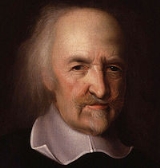
(5 April 1588 – 4 December 1679), in some older texts Thomas Hobbs of Malmsbury, was an English philosopher, best known today for his work on political philosophy
. His 1651 book Leviathan
established the foundation for most of Western political philosophy from the perspective of social contract
theory.
Hobbes was a champion of absolutism for the sovereign
but he also developed some of the fundamentals of European liberal thought
: the right of the individual; the natural equality of all men; the artificial character of the political order (which led to the later distinction between civil society
and the state); the view that all legitimate political power must be "representative" and based on the consent of the people; and a liberal interpretation of law which leaves people free to do whatever the law does not explicitly forbid.
He was one of the founders of modern political philosophy.
To understand this for sense it is not required that a man should be a geometrician or a logician, but that he should be mad.![]()
…the passion of laughter is nothing else but a sudden glory arising from sudden conception of some eminency in ourselves, by comparison with the infirmities of others, or with our own formerly…![]()
…in the state of nature, Profit is the measure of Right.![]()
Now I am about to take my last voyage, a great leap in the dark.![]()
The condition of Man...is a condition of Warre of every one against every one.![]()
Words are wise men’s counters, they do but reckon by them; but they are the money of fools, that value them by the authority of an Aristotle, a Cicero, or a Thomas, or any other doctor whatsoever, if but a man.![]()
…Understanding being nothing else, but conception caused by Speech. ![]()
…Science is the knowledge of Consequences, and dependence of one fact upon another…![]()
The privilege of absurdity; to which no living creature is subject but man only.![]()
Sudden glory is the passion which maketh those grimaces called laughter.![]()

